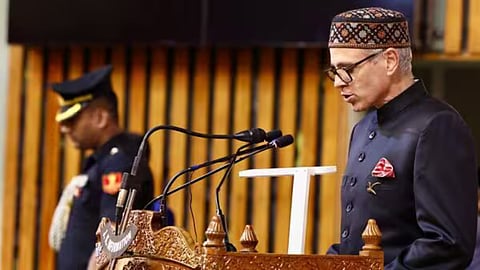

In a significant move, Omar Abdullah, the newly sworn-in Chief Minister of Jammu and Kashmir, has attempted to dispel the concerns of a Kashmir-dominant cabinet.
Seen by Kashmir observers as his first political manoeuvre after taking the oath, Omar Abdulla appointed National Conference's Jammu leader, Surinder Kumar Choudhary, as the deputy chief minister. Mr Choudhary, a former member of the Legislative Council, won from the Nowshera constituency in the Pir Panjal range of Jammu region. Considered a "giant killer", Mr Choudhary defeated Ravinder Raina, the Bharatiya Janata Party president of Jammu and Kashmir, by over 7,000 votes.
This gesture addresses the divided mandate in J&K, where the BJP won 29 of 43 seats in the Jammu division, but failed to secure a simple majority in the 90-member J&K Assembly (Kashmir division has 47 Assembly constituencies.)
The Assembly elections saw the National Conference win 42 constituencies across the Union Territory, while the BJP secured all its seats in the Jammu division. The Indian National Congress managed a mere six seats. The National Conference and the Congress, pre-poll allies, formed the government, bolstered by the support of five independents.
Mr Choudhary's appointment is seen as a strategic move to give the people of Jammu a voice and make the government more inclusive. The appointment gains further significance given the deeply polarising election campaign. BJP leaders, on multiple occasions, stated that J&K will have its first CM from Jammu and not allow traditional parties—NC and PDP—to head the UT government.
Omar Abdulla took the oath of office in the presence of the country's top Congress brass, including party president Mallikarjun Kharge, Rahul Gandhi, Priyanka Gandhi, and several India Bloc leaders.
Omar Abdullah's cabinet ministers include Sakina Itoo, Javed Rana, Satish Sharma, and Javed Ahmed Dar. Apart from Mr Choudhary and Mr Sharma, Javed Rana is from the Jammu division.
Mr Choudhary's political journey saw him associate with the Peoples Democratic Party (PDP) before joining the Bharatiya Janata Party (BJP) in March 2022. However, he exited the BJP in July 2023 to join the National Conference (NC).
Speaking to the media after the oath-taking ceremony, Surinder Choudhary said he was thankful to Chief Minister Omar Abdullah and the National Conference president, Farooq Abdullah for trusting him. “Today, the people of Nowshera are filled with pride as they have their first deputy chief minister. This is also a significant moment for the Pir Panchal region, having representation at this level for the first time.”
"A decade-long vacuum has created issues that need immediate attention, but I am committed to addressing them," he said. "I take pride in the leadership of Omar and Farooq. Back in 1996, during the height of militancy, Farooq Sahib led us through difficult times, and I have faith that, once again, we can overcome the challenges."
The National Conference leadership also inducted another lawmaker, Satish Sharma, from the Jammu region into the cabinet.
Satish Sharma, elected as an independent candidate from the Chhamb constituency of the Jammu region, defeated Bharatiya Janata Party (BJP) leader Rajeev Sharma by 6,929 votes.
Before the government formation, Sharma extended support to the National Conference-Congress alliance. Mr Sharma, the son of the late former Lok Sabha MP Madan Lal Sharma, contested as an independent candidate after Congress denied him a ticket from Chhamb.
Mr Sharma said, "Omar has truly filled the leadership void, and I will do my utmost to address the pressing issues. Compensation for those living near the border, smart meters, and statehood are all crucial matters, and we are prepared to take these concerns to the streets if necessary."
“Omar has done so much for Jammu, more than we could have asked for, and I am thankful for that. Now, it’s time for us to achieve statehood," he added.
Zafar Choudhary, a senior journalist based in Jammu, said that by appointing a Deputy Chief Minister and two ministers from Jammu in his six-member cabinet, Abdullah had sent a strong message of inclusion, aiming to move beyond politics defined by religious divides. His decision reflects courage and statesmanship, as it targets regions and communities that have not traditionally supported the National Conference, such as Jammu, where the BJP won a sweeping victory, he said in a post on X.
“As Omar Abdullah is sworn in as chief minister after a massive victory, the National Conference has done an unprecedented outreach to Jammu, the region which gave sweeping verdict to BJP in 29 out of 43 constituencies". A deputy chief minister and two ministers in a cabinet of six are essential communication to the electorate of Jammu, telling them that times will have to be created to look at the electoral battles beyond the prism of religion.
"I think it needed a lot of courage and statesmanship on Omar Abdullah’s part to go beyond its core constituency and speak to the region and communities which have not favoured National Conference in decades. This new political environment also creates opportunities of importance for the Rajouri-Poonch region which traditionally stood on the margins of the politics of Kashmir versus Jammu. It is also the first time since 1975 that a deputy chief minister is from the same party as the chief minister. In terms of regional representation, the cabinet appears reminiscent, in some ways, of the first cabinet of Sheikh Mohammad Abdullah," the journalist said on X. ds.
Meanwhile, none of the elected representatives of the Jammu and Kashmir Pradesh Congress Committee were included in the council of ministers.
(By arrangement with livemint.com)